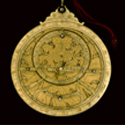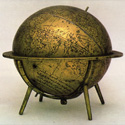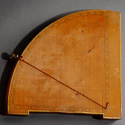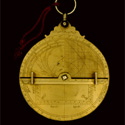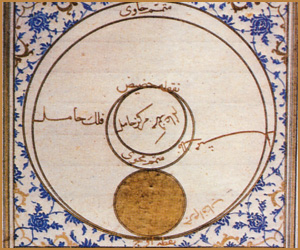Astronomy & Observations

|
Writing
on the Islamic impact in astronomy, Rybka does not fail to make
the customary remark how in the history of astronomy little
attention is given to the Islamic role in the progress of the
science. Pannekoek, for instance, only devotes seven pages to
the subject,[1]
and the Muslim theory of planetary motion, hardly taking any
interest in his work, and even Dreyer is also guilty of some
neglect.[2]
In both books, Rybka points out, there prevails the same defect
observed in most other works, namely that the role of Muslim
astronomers was simply to transmit what was found in Ptolemy’s
Almagest.[3]
Pannekoek, hence, says:
‘The Muslims did not go beyond
Ptolemy, and when they did, it was from preference to
Aristotle.’[4]
And:
‘There was a brilliant rise in Arabian
astronomy, but no significant progress. After some centuries it
died down.’[5]
Then, the same author concludes his short outline on Muslim
astronomy, saying that:
‘Arabian scientists certainly observed
diligently; they constructed new instruments, and in astronomy
they seem to have displayed more practical activity than did the
Greeks. Also the accuracy of their work often surpasses the
results of Antiquity. Their aim, however, was not to further the
progress of science-this idea was lacking throughout-but to
continue and to verify the work of their predecessors.’[6]
This
view is shared by the overwhelming majority of historians, such
as Duhem, in whose words:
‘The
revelations of Greek thought on the nature of the exterior world
ended with the ‘‘Almagest,'' (by Ptolemy) which appeared about
A.D. 145, and then began the decline of ancient learning. Those
of its works that escaped the fires kindled by Mohammedan
warriors were subjected to the barren interpretations of
Mussulman commentators and, like parched seed, awaited the time
when Latin
Christianity
would furnish a favourable soil in which they could once more
flourish and bring forth fruit.’[7]
A
view shared by Perroy:
‘All or nearly all (Muslim
astronomers), follow the practice of plagiarism of the Middle
Ages, inspiring themselves for more than half of the works of
Ptolemy, whose text they copied.’[8]
Dreyer tells us:
‘Though Europe owes a debt of
gratitude to the Arabs for keeping alive the flame of science
for many centuries and for taking observations, some of which
are still of value, it cannot be denied that they left astronomy
much as they found it.’[9]
And:
‘When the Europeans again began to
occupy themselves with sciences, they found astronomy
practically in the same state in which Ptolemy had left it in
the second century.’[10]
This view is common to the
overwhelming majority of writing on the history of astronomy.[11]
But there is even worse than this, i.e when Islamic astronomy is
completely blotted out. J.P. Verdet, for instance, in a History
of astronomy, jumps from Ptolemy to Copernicus, skipping nearly
1500 years.[12]
And so does Neugebauer in his
Astronomy and History.[13]
These views, however, are wholly
contradicted by history as seen in the following outline.
1. Islamic Astronomy: Inanities of
Historical Writing:
First and foremost, Islamic astronomy is not a replica of Greek
astronomy, nor was it stimulated in its rise by Greek astronomy.
The Greek legacy in this field, as in all other sciences, was
only a tool for the Muslims, a tool as good and as limited as
others, the Hindu, the Chinese, the African, the Roman, and the
pre-Islamic, which all acted as means (tools) for the Islamic
civilisation. The Chinese source, rather than the Greek, in
fact, played a much greater part than any other in the thriving
Islamic civilisation. This has already been partly seen in the
first part of this book, and the chapters on the diverse
sciences, in this part, will confirm this point. The following
will also confirm, and highlight that the foundation of Islamic
science, the real inspiration, comes not from
[1]
A.
Pannekoek: A History of Astronomy (George Allen
and Unwin Ltd; London; 1961).
[2]
E. Rybka: Mouvement des Planetes dans l’Astronomie des
Peuples de l’Islam; in Convegno; op cit; pp.
579-93; at
p. 579.
[3]
Ibid.
[4]
A.
Pannekoek: A History of Astronomy; op cit; p.
170.
[5]
Ibid.
[6]
Ibid; p.169.
[7]
P. Duhem: Medieval Physics, in R. Palter edition:
Toward Modern
Science (The Noonday Press; New York; 1961), Vol 1;
pp 141-159; Quote at p. 141; This article is a
reprint from ‘Physics, history of,''
Catholic
Encyclopaedia, XII (1911), pp 47-52.
[8]
E. Perroy: Encore Mahomet et Charlemagne in Bedeutung;
op cit; pp. 266-75, at p.271.
[9]
J.L.E. Dreyer: A
History of Astronomy from Thales to Kepler (Dover
Publications Inc, New York, 1953), p.249.
[10]
Ibid; p.279-80.
[11]
Such as in:
- O. Pedersen:
Early Physics and Astronomy (Cambridge University
Press, 1974).
-J.
Delambre:
Histoire de l'Astronomie Ancienne (Johnson Reprint
Collection; New York, 1965).
-Or many Websites as seen in the late 1990s, such as at:
http://w3.restena.lu/al/pub/indivs/wagnjean/astronomy.htm#medieval
[12]
J. P. Verdet:
Une Histoire de
l'Astronomie (Le Seuil, Paris, 1990).
[13]
O. Neugebauer:
Astronomy
and History (Verlag, 1983).
|

